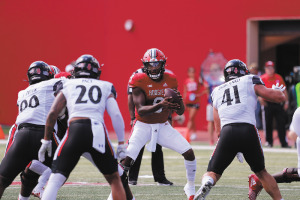Letter: Teachers can reuse event materials
We at Teachers’ Treasures happily find homes for all sorts of things folks don’t think have value.
We at Teachers’ Treasures happily find homes for all sorts of things folks don’t think have value.
We keep wanting to lower taxes but then never get done what is needed.
Indianapolis taxpayers have subsidized Jim Irsay’s lavish lifestyle for far too long.
As the calendar flips to October, investors will face various scary “ghosts and goblins,” including the collapse of one of China’s largest real estate developers (China Evergrande Group), the recurring brinksmanship over raising the debt ceiling to forestall a government default/shutdown, and the Federal Reserve’s removing pandemic-related emergency measures.
First, let’s all stop vilifying one another. Progressives are not barbarians, conservatives are not oppressors, and classical liberals are not anarchists.
At Salesforce, we joined more than 220 companies of all sizes and sectors across the country in calling for the Senate to come together in a bipartisan way to ensure voting rights are protected, as they have done five times since the Voting Rights Act passed in 1965.
Thank you to Aaron Renn for an assertive and well-thought-out piece on the future of the City-County Building! You took the words right out of my mouth!
While a federal vaccine mandate for certain employers is looming, we believe that decision should be left up to individual employers. They are in the best position to address any work environment challenges.
Why doesn’t the reward of more hard work after a job well done motivate the most productive workers to stay with an organization? How can employers successfully appreciate employees and motivate them to maximize productivity?

All these years later, this forgotten chapter in Miller’s fabled career is a reminder of how fragile reputations can be.
For instance, roughly seven of 10 pre-retirees plan to work for pay as a means for retirement, while in retirement. When in reality, the 2021 survey finds just over two in 10 retirees end up working for pay as a source of retirement income.
In fact, our team is observing that “people strategy” is becoming the No. 1 agenda item at executive-planning retreats across industry and geography.
Transit is absolutely an important component of successful, livable places. But it’s all the things that surround transit that the new zoning overlay addresses.
This new, permanent section will feature stories produced, written and edited by our new colleagues: Gerry Dick, Alex Brown, Wes Mills, Reed Parker and Mary Roberts. Business news from places like Lafayette, Terre Haute, Hammond, New Albany, Elkhart and beyond will now be more readily available to IBJ readers.
As long as the GOP increasingly caters to and relies on those whose worldview is rooted in fantasy, it should not be surprised that intelligent people who are committed to truth and must operate in the real world lean in other directions.
How do we quickly turn the tide of addiction while simultaneously growing our business, our workforce and our impact on the local communities? It is time for business leaders to change their practices to encourage the workforce in their pursuit of recovery.
When bond repayments come due, taxpayers in the future must reduce their consumption.

Clarity. That’s what October is for.
This policy of “your body, my choice” is dated and misguided based on real science on what these shots are, how they work and the global results.
Half the population can’t make ends meet financially and amounts of tax-dollar expenditures only raise concern when earmarked for infrastructure and people here.